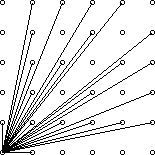欧拉函数裸题,直接欧拉函数值乘二加一就行了。具体证明略,反正很简单。
题干:
Description
A lattice point (x, y) in the first quadrant (x and y are integers greater than or equal to 0), other than the origin, is visible from the origin if the line from (0, 0) to (x, y) does not pass through any other lattice point. For example, the point (4, 2) is not visible since the line from the origin passes through (2, 1). The figure below shows the points (x, y) with 0 ≤ x, y ≤ 5 with lines from the origin to the visible points.

Write a program which, given a value for the size, N, computes the number of visible points (x, y) with 0 ≤ x, y ≤ N.
Input
The first line of input contains a single integer C (1 ≤ C ≤ 1000) which is the number of datasets that follow.
Each dataset consists of a single line of input containing a single integer N (1 ≤ N ≤ 1000), which is the size.
Output
For each dataset, there is to be one line of output consisting of: the dataset number starting at 1, a single space, the size, a single space and the number of visible points for that size.
Sample Input
4 2 4 5 231
Sample Output
1 2 5 2 4 13 3 5 21 4 231 32549
#include<iostream> #include<cstdio> #include<cmath> #include<ctime> #include<queue> #include<algorithm> #include<cstring> using namespace std; #define duke(i,a,n) for(int i = a;i <= n;i++) #define lv(i,a,n) for(int i = a;i >= n;i--) #define clean(a) memset(a,0,sizeof(a)) const int INF = 1 << 30; typedef long long ll; typedef double db; template <class T> void read(T &x) { char c; bool op = 0; while(c = getchar(), c < '0' || c > '9') if(c == '-') op = 1; x = c - '0'; while(c = getchar(), c >= '0' && c <= '9') x = x * 10 + c - '0'; if(op) x = -x; } template <class T> void write(T x) { if(x < 0) putchar('-'), x = -x; if(x >= 10) write(x / 10); putchar('0' + x % 10); } int phi[1000005],n; void init(int n) { phi[1] = 1; duke(i,2,n) { phi[i] = i; } duke(i,2,n) { if(phi[i] == i) { for(int j = i;j <= n;j += i) { phi[j] = phi[j] / i * (i - 1); } } } duke(i,2,n) { phi[i] = phi[i - 1] + phi[i]; } } int dp[10004],maxn = 0; int main() { read(n); duke(i,1,n) { read(dp[i]); maxn = max(maxn,dp[i]); } init(maxn); duke(i,1,n) { printf("%d %d %d\n",i,dp[i],phi[dp[i]] * 2 + 1); } return 0; }
代码: